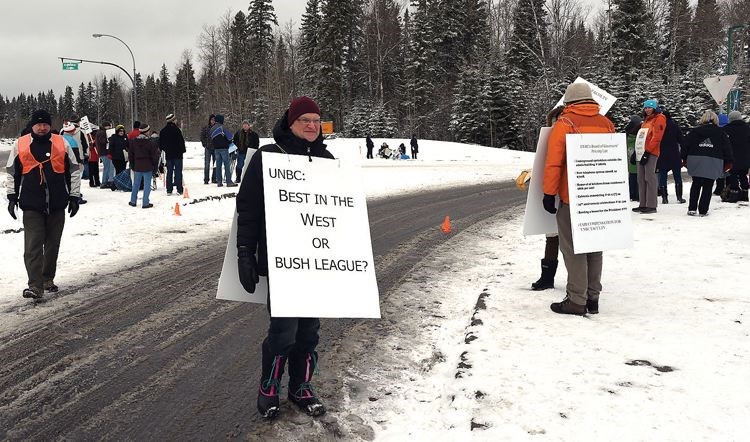An arbitrator has handed University of Northern B.C. and its faculty their first collective agreement, awarding faculty a 10 per cent wage increase over the course of the five-year contract.
Dan Ryan, UNBC's acting Vice President Academic and Provost, posted the update Thursday afternoon for the contract which is backdated from July 1, 2014 to June 30, 2019.
"During bargaining, the university tabled a proposal consistent with the provincial bargaining mandate, which included net-zero and other cost-saving trade-offs that will substantially offset the financial impacts of this award," Ryan said in the statement, adding faculty is eligible to receive the Economic Stability Dividend along with other public sector employees in B.C. if the provincial economic growth exceeds Economic Forecast Council forecasts.
In an emailed statement, the UNBC Faculty Association said it was "deeply disappointed that the arbitrator’s award did not address structural problems with compensation at UNBC that the UNBC administration itself has acknowledged."
The decision comes after the university and faculty made their respective cases before arbitrator Stanley Lanyon. The UNBC Faculty Association had provided a 140-page submission in support of its position while the administration's submission added up to 81 pages.
The Labour Relations Board's mediator ordered the binding arbitration after being called in by the university through a process only permitted for first collective agreements.
Thursday's announcement is the culmination of a long-running dispute, including a two-week strike in March. Throughout the dispute, the university acknowledged the gap, but said it must comply with the province's economic mandate and offered a five year deal totaling 5.5 per cent. It later added "Enhanced Career Development" increments to close the gap for some, dependent on peer review and a merit-based approach the faculty criticized.
In his decision, Lanyon said he'd awarded the 5.5 per cent plus an additional 4.5 per cent which could "be seen as 'catch up,' in which faculty salaries at UNBC not only do not fall further behind, but begin the process of reducing the difference between UVic and UNBC faculty salaries."
Ryan said Lanyon also recommended the two sides work with the LRB's mediation program to strengthen the relationship before the agreement expires in 2019.
"As is often the case in arbitration, compromise is essential to moving forward. Now that the process is complete, it is also important for the University community to foster respectful dialogue and work towards win-win situations in which we all benefit. We must reach a system that not only rewards, but facilitates outstanding teaching, research and service," Ryan wrote.
Lanyon ends the decision with this: “A five year agreement will provide the parties with stability, and an opportunity to develop a relationship outside the context of adversarial bargaining.”
More to come and Ryan's statement is online here.



